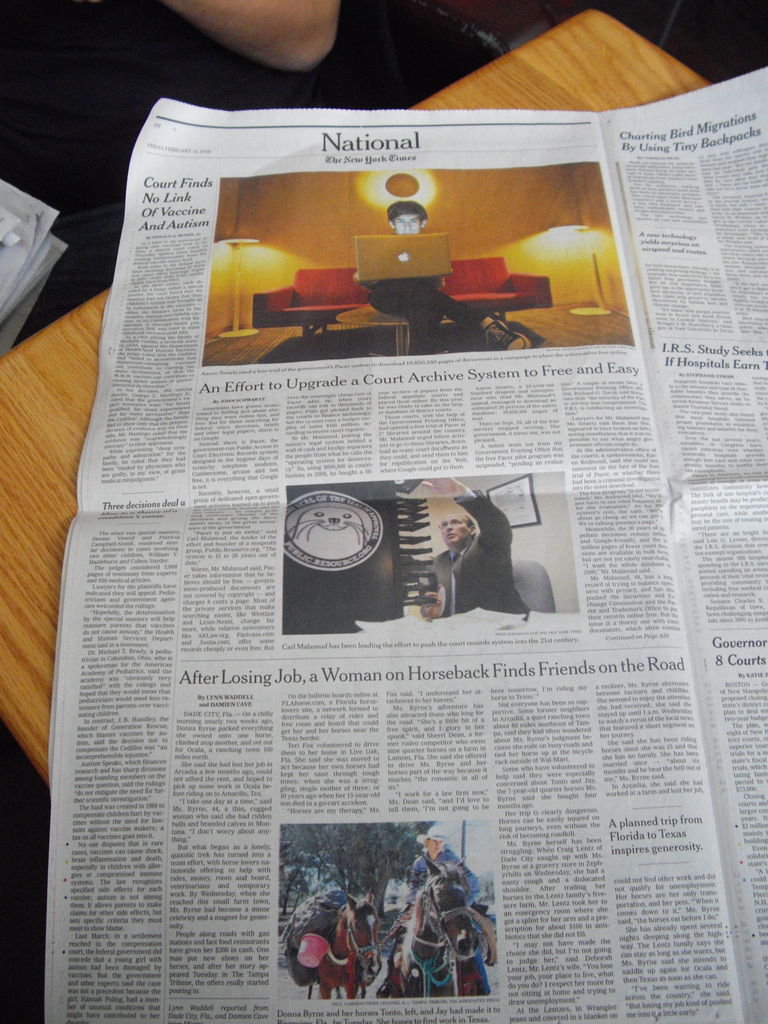| Vladimir Putin appears to be up to tricks again. One of his leading political opponents was convicted of fraud this week, then released on a suspended sentence, and then re-arrested hours later at an unauthorized protest. Putin’s government seems intent on squashing criticism and keeping people from hearing opposing views. But he’s going about it all wrong. Just let people say whatever they want on any number of platforms, from endless cable TV channels to even more endless blogs and Twitter posts. Pretty soon, nobody would pay attention. At least, that seems to be what’s happening in this country. The dawn of this new year is not the first time pollsters and academics have struggled to find |
| | reasons for widespread and growing public ignorance in the midst of the greatest explosion of accessible information in recorded history. But a new poll has found that not only are Americans mostly ignorant of current events, a vast majority doesn’t think it’s important even to try to keep up with what’s happening. The poll, by the Associated Press-Gfk, measured Americans’ sense of civic duty in questions that covered everything from volunteer work to jury duty. The picture it paints is not good. It certainly doesn’t resemble anything Norman Rockwell might have done. And among the results, only 37 percent of those surveyed said they feel it is important to keep up with news or public issues. The ironies at play here are rich. About a year and a half ago, the Pew Research Center’s Internet & American Life Project determined 61 percent of Americans owned a smart phone. Given how quickly that percentage grew from earlier surveys, my guess is the figure is higher today. That means a solid majority of us carry in our pockets a device that instantly can put us in touch with breaking news in a variety of formats, including video and text. It provides access to millions of books and videos. Daily newscasts are available as podcasts. Breaking stories stream online. Alerts can be programmed to tell us instantly when something important happens. It’s a marvelous tool previous generations may not have dreamed was possible, and yet we use it to watch cat videos. Thirty years ago, Neil Postman published his book, “Amusing ourselves to death,” which argued that television was conditioning the nation to expect the world to be more entertaining than informative or interesting. But he hadn’t imagined what it would be like when social media allowed us to be the entertainers, as well. The website Openeducation.net has agonized, “Given that we are in the midst of an information age, the fact that so many of us are uninformed has experts scratching their heads. Is the failure one of effort or a result of the pace of our society? Is it a lack of intellectual prowess that prevents the assimilation of all the available information or an overall malaise that overcomes even the most well-intentioned of efforts?” Or is it perhaps that the easier something is to achieve, the more we take it for granted? If the party conversation turns to the crash of an AirAsia flight, we can hit the Google app on our phone and quickly learn enough to keep up. Why worry about it ahead of time? The problem isn’t so much that information is available at the exact moment we need it, it is that so few people have any desire, or natural curiosity, to know about the world around them until it is needed. Blame anything you want, from public education to the ease of general prosperity to the widespread cynicism wrought by cranks who also access the information stream. We all have a stake in somehow finding a cure. The consequences are more serious than many people believe. In 1597, Sir Francis Bacon wrote “scientia potential est,”which translates as “knowledge is power.” Those who are motivated to use the Information Age hold a distinct advantage over everyone else. Russia’s government is hardly the first to want to suppress information, but there is little difference between that and a nation in which people have access to information but choose not to seek it. |


 RSS Feed
RSS Feed

